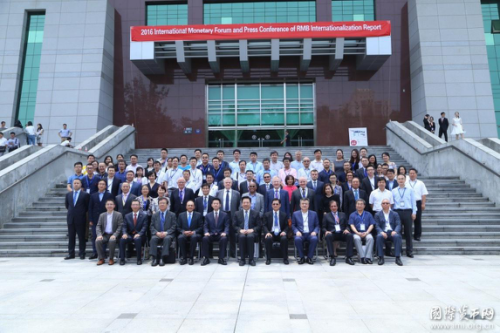2016 International Monetary Forum and Press Conference of RMB Internationalization Report was Held in Renmin University
2016-07-24 IMI This forum is hosted by Renmin University and Bank of Communications, co-sponsored by the School of Finance of Renmin University, China Financial Policy Research Center, OMFI, and organized by International Masonry Institute. The opening ceremony of the forum and Press Conference of RMB Internationalization Report consists four parallel forums. Guo Qingwang was the moderator of the Press Conference.
This forum is hosted by Renmin University and Bank of Communications, co-sponsored by the School of Finance of Renmin University, China Financial Policy Research Center, OMFI, and organized by International Masonry Institute. The opening ceremony of the forum and Press Conference of RMB Internationalization Report consists four parallel forums. Guo Qingwang was the moderator of the Press Conference.
 President Liu Wei made an opening remark on behalf of Renmin University. He pointed out that Renmin University make full use of its academic advantage and rich talent resource to publish research reports of great international influence. Renmin University is becoming an important think tank for the new round of reform in China. In the past five years, policy makers in China attached great importance to the RMB Internationalization Report, because the Report provided an independent and objective reference to the decision making. It also raised wide attention in the International Community after the publication of the English, Japanese and Korean version. President Liu believed that the Report as an important reference would promote RMB internationalization and become a successful example for the cooperation between universities and companies.
President Liu Wei made an opening remark on behalf of Renmin University. He pointed out that Renmin University make full use of its academic advantage and rich talent resource to publish research reports of great international influence. Renmin University is becoming an important think tank for the new round of reform in China. In the past five years, policy makers in China attached great importance to the RMB Internationalization Report, because the Report provided an independent and objective reference to the decision making. It also raised wide attention in the International Community after the publication of the English, Japanese and Korean version. President Liu believed that the Report as an important reference would promote RMB internationalization and become a successful example for the cooperation between universities and companies.
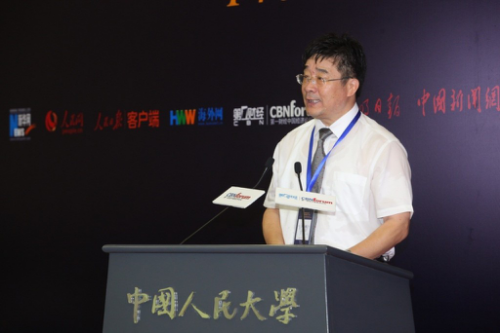 Deputy director Wang Jiang first reviewed the cooperation between BCM and IMI. He believed that since the 2012 cooperation in RMB Internationalization Research was established, the RMB Internationalization Report and the RMB Internationalization Index had become an important reference for high-level policy making in the past 5 years. BCM and Renmin University also set an example for future cooperation between universities and banks. Besides, Wang Jiang also introduced BCM’s recent achievements in cross-border RMB clearing, oversea business development, and serving the real economy.
Deputy director Wang Jiang first reviewed the cooperation between BCM and IMI. He believed that since the 2012 cooperation in RMB Internationalization Research was established, the RMB Internationalization Report and the RMB Internationalization Index had become an important reference for high-level policy making in the past 5 years. BCM and Renmin University also set an example for future cooperation between universities and banks. Besides, Wang Jiang also introduced BCM’s recent achievements in cross-border RMB clearing, oversea business development, and serving the real economy.
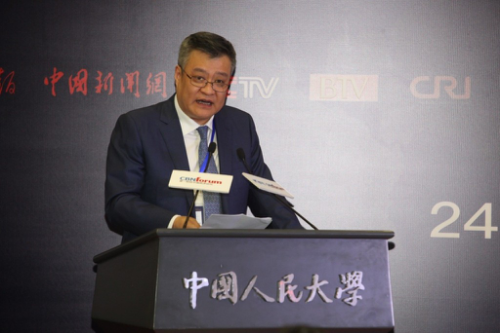 After that, Li Yang, Chen Yunxian, Chen Yulu, Yaseen Anwar, Wu Qing, and Anoop Singh made their keynote speech. Li Yang believed that RMB played the role as a Safe Haven Currency last year. He emphasized on two major issues in RMB internationalization. Firstly, we should keep the currency value stable. After RMB being included in SDR, we should redefine the value basis for RMB floating. Secondly, interest rate deregulation is also an important aspect. The current exchange rate depends mostly on the interest rate. We should accelerate in interest rate deregulation, establish an interest rate system that fully depends on the market, build up efficient interest rate structure and a fully market-regulated interest rate system. He believed that RMB would play a more important role in the international market only if domestic challenges were solved.
After that, Li Yang, Chen Yunxian, Chen Yulu, Yaseen Anwar, Wu Qing, and Anoop Singh made their keynote speech. Li Yang believed that RMB played the role as a Safe Haven Currency last year. He emphasized on two major issues in RMB internationalization. Firstly, we should keep the currency value stable. After RMB being included in SDR, we should redefine the value basis for RMB floating. Secondly, interest rate deregulation is also an important aspect. The current exchange rate depends mostly on the interest rate. We should accelerate in interest rate deregulation, establish an interest rate system that fully depends on the market, build up efficient interest rate structure and a fully market-regulated interest rate system. He believed that RMB would play a more important role in the international market only if domestic challenges were solved.
 Chen Yunxian suggested that onshore trade and settlement centers for RMB offshore business should be established in Guangdong and Shanghai Free Trade Zones. Regarding the framework of these centers, Chen believed that we should serve the real economy with financing, focus on reform, innovation and risk control, and separate the settlement of domestic and international currency trade. From the regional perspective, we should first begin with Guangdong and Shanghai Free Trade Zones and borrow experiences from the US and Japan in currency internationalization. He suggested that Bank of China should authorize these onshore trade and settlement centers to establish special accounts to facilitate the offshore RMB financing.
Chen Yunxian suggested that onshore trade and settlement centers for RMB offshore business should be established in Guangdong and Shanghai Free Trade Zones. Regarding the framework of these centers, Chen believed that we should serve the real economy with financing, focus on reform, innovation and risk control, and separate the settlement of domestic and international currency trade. From the regional perspective, we should first begin with Guangdong and Shanghai Free Trade Zones and borrow experiences from the US and Japan in currency internationalization. He suggested that Bank of China should authorize these onshore trade and settlement centers to establish special accounts to facilitate the offshore RMB financing.
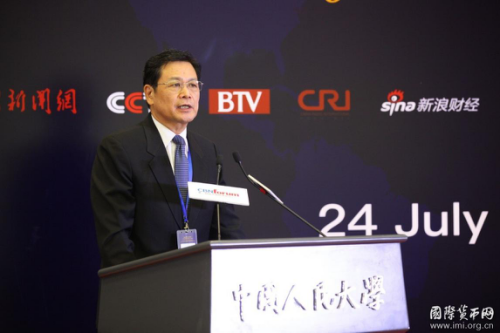 Chen Yulu concluded four major achievements of the RMB internationalization in recent years. He mentioned that RMB internationalization is the result of the increasing overall national strength, fast development of financial market and market-based policies. In long term, the RMB market demand will continue to increase. We will keep the RMB exchange rate stable with other SDR currencies, and further optimize the existing policy structure for cross border payment. We will promote the opening of the capital market in both directions, and improve the infrastructure for RMB internationalization. We will use bilateral or multilateral mechanism to establish a beneficial international environment for RMB internationalization in long term.
Chen Yulu concluded four major achievements of the RMB internationalization in recent years. He mentioned that RMB internationalization is the result of the increasing overall national strength, fast development of financial market and market-based policies. In long term, the RMB market demand will continue to increase. We will keep the RMB exchange rate stable with other SDR currencies, and further optimize the existing policy structure for cross border payment. We will promote the opening of the capital market in both directions, and improve the infrastructure for RMB internationalization. We will use bilateral or multilateral mechanism to establish a beneficial international environment for RMB internationalization in long term.
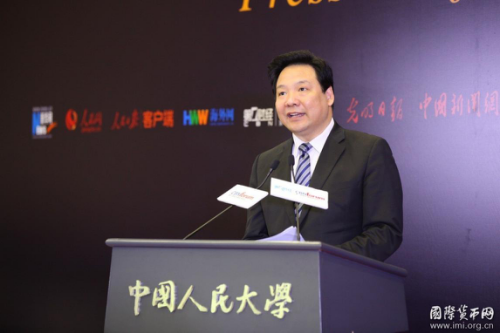 Yaseen Anwar shared his view in “Regional Infrastructure Development and RMB Internationalization”to discuss financing challenges in Asian infrastructure development. He believed that RMB, as the IMF reserve currency, had a huge potential. Since the current currency policy around the world was unstable, the development of a better and more stable currency system had become an important topic. He pointed out that the Belt and Road Initiative played an important role in rebalancing the world economic structure. Infrastructure developing projects financed by RMB had create a lot of job opportunities in Pakistan, Lao, and Brazil, which helped the local economic growth.
Yaseen Anwar shared his view in “Regional Infrastructure Development and RMB Internationalization”to discuss financing challenges in Asian infrastructure development. He believed that RMB, as the IMF reserve currency, had a huge potential. Since the current currency policy around the world was unstable, the development of a better and more stable currency system had become an important topic. He pointed out that the Belt and Road Initiative played an important role in rebalancing the world economic structure. Infrastructure developing projects financed by RMB had create a lot of job opportunities in Pakistan, Lao, and Brazil, which helped the local economic growth.
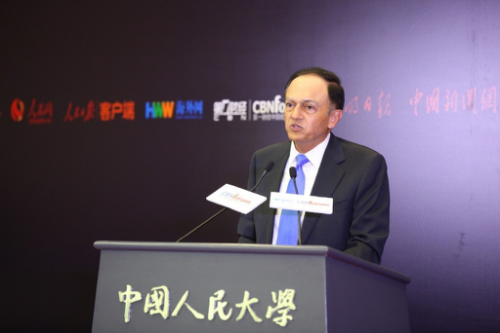 Anoop Singh mainly discussed China capital account liberalization and its challenges. He mentioned that RMB internationalization would influence the RMB exchange rate in the onshore and offshore market. Thus, China should watch out for macro-financial risks. The capital account liberalization in China requires a stable capital market and healthy financial institutions to facilitate a stable macro economy. After RMB entering the SDR, the central bank in China should communicate with IMF members and widely take part in international affairs to enhance RMB’s importance in SDR. In the end, he emphasized that RMB liberalization will stabilize the capital account, and build a better capital market.
Anoop Singh mainly discussed China capital account liberalization and its challenges. He mentioned that RMB internationalization would influence the RMB exchange rate in the onshore and offshore market. Thus, China should watch out for macro-financial risks. The capital account liberalization in China requires a stable capital market and healthy financial institutions to facilitate a stable macro economy. After RMB entering the SDR, the central bank in China should communicate with IMF members and widely take part in international affairs to enhance RMB’s importance in SDR. In the end, he emphasized that RMB liberalization will stabilize the capital account, and build a better capital market.
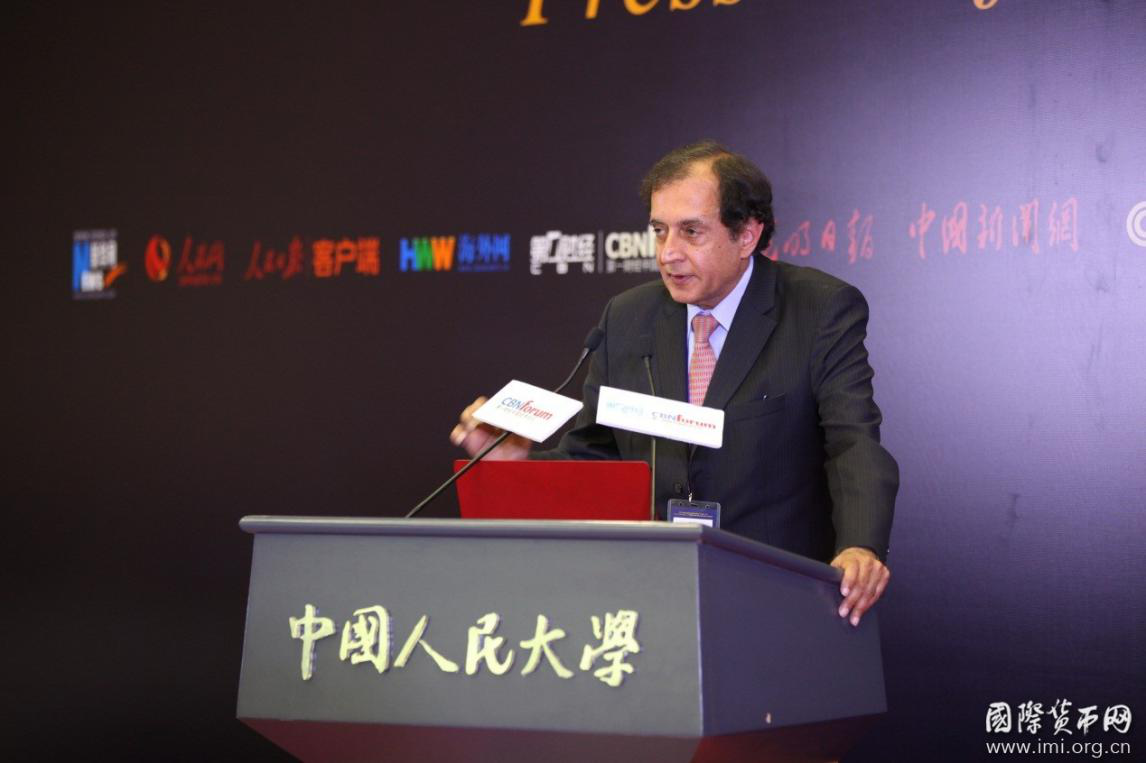 Wu Liqing discussed the role of capital market in RMB internationalization. He believed that if RMB cannot be used in investment, its value in trading would also be affected, not mention its role as a reserve currency. Therefore, capital market should play an important role in RMB internationalization. Wu also mentioned that RMB capital owned by oversea institutions and personnel had exceeded 3.7 trillion. Capital market is a platform for capital asset pricing and trading. It can provide more possibilities for RMB internationalization. Besides, he also introduced international finance and trade platform such as Shanghai-Hong Kong Stock Connect, Shanghai-Europe Stock Connect, and Shanghai-London Stock Connect. He hoped that these platforms would accelerate the RMB internationalization.
Wu Liqing discussed the role of capital market in RMB internationalization. He believed that if RMB cannot be used in investment, its value in trading would also be affected, not mention its role as a reserve currency. Therefore, capital market should play an important role in RMB internationalization. Wu also mentioned that RMB capital owned by oversea institutions and personnel had exceeded 3.7 trillion. Capital market is a platform for capital asset pricing and trading. It can provide more possibilities for RMB internationalization. Besides, he also introduced international finance and trade platform such as Shanghai-Hong Kong Stock Connect, Shanghai-Europe Stock Connect, and Shanghai-London Stock Connect. He hoped that these platforms would accelerate the RMB internationalization.
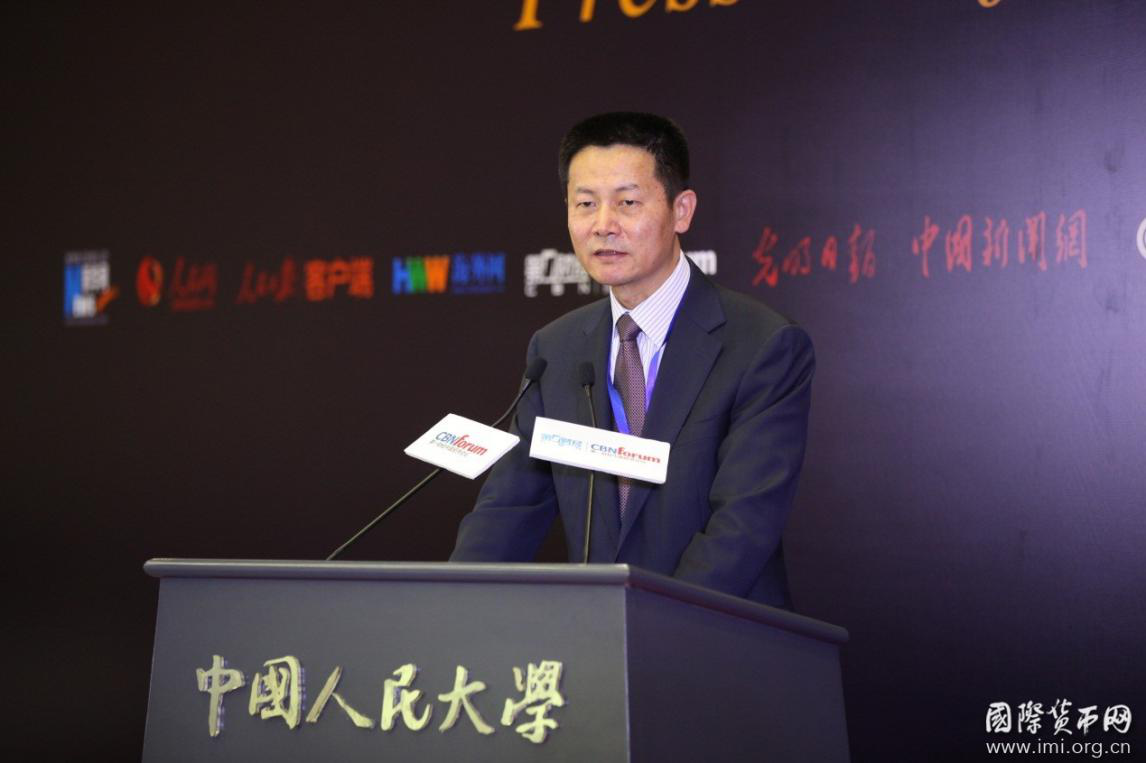 During the luncheon, Xia Le, Chief Economist for Asia of Banco Bibao Vizeaya Argentaria shared his view on “RMB internationalization from world and local perspective”. He observed that world economic growth fell into uncertainties and practices of RMB internationalization in past few years encourage us to review our strategies and future goals in RMB internationalization. We should pay special attention to the relationship between RMB internationalization and interest rate marketization, between the elastic exchange rate and capital account liberalization.
The theme of the parallel forum I is Reform of RMB Exchange Rate System and Prevention of Exchange Rate Risks. The forum is chaired by Bi Shenglin, Executive Director of IMI. DurIng the forum, Zhou Ading, Former Deputy Governor of the Central Bank of Taiwan, Chairman of the board of Taipei Foreign Exchange Market Development Foundation; Alistair M Michie, Senior Advisor of SAFEA; Ding Zhijie, Assistant President of University of International Business and Economics; Ding Jianping, Vice Dean of SIIFC; Herbert Poenisch, Former Senior Economist of BIS; Dr. Jaya Josie, Head of the HSRC BRICS Research Centre; E Zhihuan, Deputy General Manager, Economics & Strategic Planning Department, Bank of China (Hong Kong); and Nicholas Beale,Chairman of Sciteb delivered keynote speeches. David Marsh, Managing Director and Co-Founder of OMFIF sent his video speech from England. Wei Benhua, former deputy administrator-in-bureau at the State Administration of Foreign Exchange; Zhang Zhixiang: Former Director General, International Department, PBOC; Marlene Amstad, Former Regional Adviser, BIS; Professor of Practice in Economics, The Chinese University of Hong Kong; Sergey Tsyplakov, Chief Representative of Savings Bank of the Russian Federation in China, Zong Liang, Vice-director, Institute of International Finance, Bank of China and other guests held round table meetings on the theme.
During the luncheon, Xia Le, Chief Economist for Asia of Banco Bibao Vizeaya Argentaria shared his view on “RMB internationalization from world and local perspective”. He observed that world economic growth fell into uncertainties and practices of RMB internationalization in past few years encourage us to review our strategies and future goals in RMB internationalization. We should pay special attention to the relationship between RMB internationalization and interest rate marketization, between the elastic exchange rate and capital account liberalization.
The theme of the parallel forum I is Reform of RMB Exchange Rate System and Prevention of Exchange Rate Risks. The forum is chaired by Bi Shenglin, Executive Director of IMI. DurIng the forum, Zhou Ading, Former Deputy Governor of the Central Bank of Taiwan, Chairman of the board of Taipei Foreign Exchange Market Development Foundation; Alistair M Michie, Senior Advisor of SAFEA; Ding Zhijie, Assistant President of University of International Business and Economics; Ding Jianping, Vice Dean of SIIFC; Herbert Poenisch, Former Senior Economist of BIS; Dr. Jaya Josie, Head of the HSRC BRICS Research Centre; E Zhihuan, Deputy General Manager, Economics & Strategic Planning Department, Bank of China (Hong Kong); and Nicholas Beale,Chairman of Sciteb delivered keynote speeches. David Marsh, Managing Director and Co-Founder of OMFIF sent his video speech from England. Wei Benhua, former deputy administrator-in-bureau at the State Administration of Foreign Exchange; Zhang Zhixiang: Former Director General, International Department, PBOC; Marlene Amstad, Former Regional Adviser, BIS; Professor of Practice in Economics, The Chinese University of Hong Kong; Sergey Tsyplakov, Chief Representative of Savings Bank of the Russian Federation in China, Zong Liang, Vice-director, Institute of International Finance, Bank of China and other guests held round table meetings on the theme.
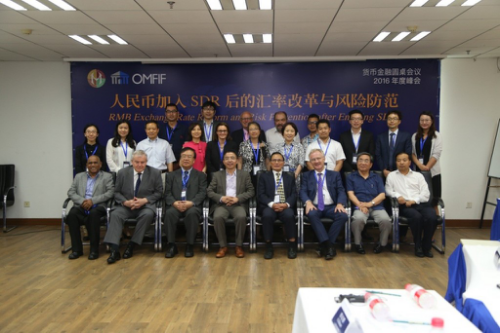 The theme of the Parallel Forum II is “Chinese Capital Market: open-up, risk and supervision”. Zhao Xijun Associate Dean, School of Finance, Renmin University of China chaired the meeting. Wang Guogang, Institute of Finance & Banking, Chinese Academy of Social Sciences; Jiao Jinpu,chairman of Shanghai Gold Exchange; Wu Qing,Research fellow, Development Research Center of the State Council;Ying Zhanyu,Deputy Director, School of Finance, Central University of Finance and Economics;Guan Qingyou,Vice-president of Minsheng Securities Co., Ltd.; Hong Hao,Managing Director and the chief strategist of BOCOM International Holdings;Chen Qiqing,Dean of Macroeconomy, Department of Economics, Party Central school, delivered keynote speeches. Li Lin, Chief Economist, Noble Group; Kong Qinglong, Director of private banking department, China MInsheng Bank; Yu Pingkang, Chief Economist, Changjiang Pension Insurance also joined the discussion.
The theme of the Parallel Forum II is “Chinese Capital Market: open-up, risk and supervision”. Zhao Xijun Associate Dean, School of Finance, Renmin University of China chaired the meeting. Wang Guogang, Institute of Finance & Banking, Chinese Academy of Social Sciences; Jiao Jinpu,chairman of Shanghai Gold Exchange; Wu Qing,Research fellow, Development Research Center of the State Council;Ying Zhanyu,Deputy Director, School of Finance, Central University of Finance and Economics;Guan Qingyou,Vice-president of Minsheng Securities Co., Ltd.; Hong Hao,Managing Director and the chief strategist of BOCOM International Holdings;Chen Qiqing,Dean of Macroeconomy, Department of Economics, Party Central school, delivered keynote speeches. Li Lin, Chief Economist, Noble Group; Kong Qinglong, Director of private banking department, China MInsheng Bank; Yu Pingkang, Chief Economist, Changjiang Pension Insurance also joined the discussion.
 The theme of Parallel Forum III is “Supply-Side Reform and Risk Prevention of Real Economy. Qu Qiang, Director of China Financial Policy Research Center, hosted the meeting. Pei Changhong, Director of the Institute of Economic Research, CASS; Jia Kang, Director of China Academy of New Supply-side Economics; Liu Jun, Vice president of China Everbright Group Limited; Huang Jinlao, Executive Vice President of Suning Financial Group; Zhang Jinyuan, Governor of Taiwan Yongfeng Bank, Chief Financial Officer of Taiwan Yong Feng Financial Holdings delivered keynote speeches. Zhou Daoxu, President of Huarong International Trust Co., Ltd and Zhou Chunsheng, Professor of Finance, Changjiang Business School joined the discussion.
The theme of Parallel Forum III is “Supply-Side Reform and Risk Prevention of Real Economy. Qu Qiang, Director of China Financial Policy Research Center, hosted the meeting. Pei Changhong, Director of the Institute of Economic Research, CASS; Jia Kang, Director of China Academy of New Supply-side Economics; Liu Jun, Vice president of China Everbright Group Limited; Huang Jinlao, Executive Vice President of Suning Financial Group; Zhang Jinyuan, Governor of Taiwan Yongfeng Bank, Chief Financial Officer of Taiwan Yong Feng Financial Holdings delivered keynote speeches. Zhou Daoxu, President of Huarong International Trust Co., Ltd and Zhou Chunsheng, Professor of Finance, Changjiang Business School joined the discussion.
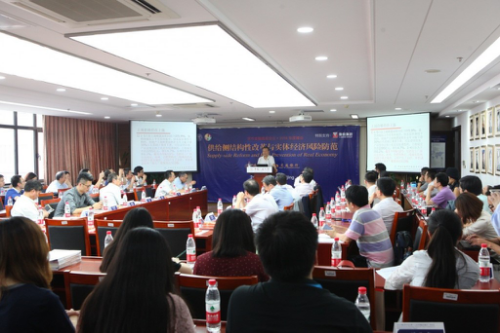 Parallel Forum IV is “Dialogue between Chinese and American Student Leaders”. In this forum, student representatives from Renmin University, Tsinghua University, Yale University and other famous universities held a round table meeting on “China-US Cooperation: How to defend against Macro-Financial Risks” in Chinese. He Qing, Professor of the School of Finance of Renmin University hosted the meeting. Feng Yu, Academic Director of CET Academic Program; He Gang, Executive Editor of Caijing Magazine; Cai Yingyi, Associate Professor of Applied Economics Department, Taiwan Kaohsiung University; Qian Zongxin Associate Professor of School of Finance, Renmin University of China made comments. Ji Hongbo, Secretary of the party committee of School of Finance, Renmin University closed the meeting by commenting that, “Dialogue between Chinese and American Student Leaders” has been held for three times. It provides a stage for youth elites around the world to show their academic talent, and helps students from both China and America know better about China-U.S. Cooperation and other major strategic issues in the process of renminbi industrialization.
Parallel Forum IV is “Dialogue between Chinese and American Student Leaders”. In this forum, student representatives from Renmin University, Tsinghua University, Yale University and other famous universities held a round table meeting on “China-US Cooperation: How to defend against Macro-Financial Risks” in Chinese. He Qing, Professor of the School of Finance of Renmin University hosted the meeting. Feng Yu, Academic Director of CET Academic Program; He Gang, Executive Editor of Caijing Magazine; Cai Yingyi, Associate Professor of Applied Economics Department, Taiwan Kaohsiung University; Qian Zongxin Associate Professor of School of Finance, Renmin University of China made comments. Ji Hongbo, Secretary of the party committee of School of Finance, Renmin University closed the meeting by commenting that, “Dialogue between Chinese and American Student Leaders” has been held for three times. It provides a stage for youth elites around the world to show their academic talent, and helps students from both China and America know better about China-U.S. Cooperation and other major strategic issues in the process of renminbi industrialization.
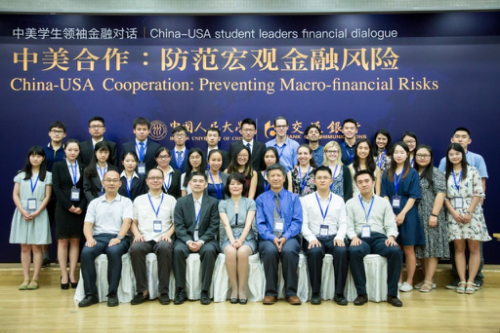 International monetary forum is an annual international forum held by IMI. Since 2012, it has been held for 5 times. The forum releases Reminbi Industrialization Report periodically and discusses weighty international financial issues. The forum attracts famous scholars from institutes, government agencies and financial institutions in Europe, U.S., and Asia.
International monetary forum is an annual international forum held by IMI. Since 2012, it has been held for 5 times. The forum releases Reminbi Industrialization Report periodically and discusses weighty international financial issues. The forum attracts famous scholars from institutes, government agencies and financial institutions in Europe, U.S., and Asia.
